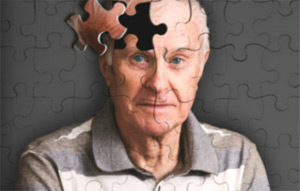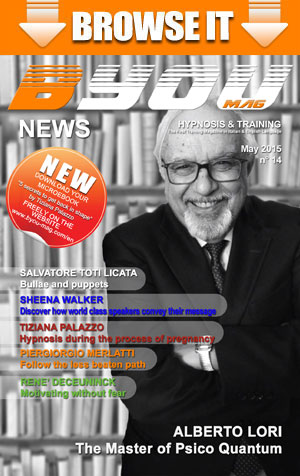ALZHEIMER’S: MEDICAL AND SOCIAL EMERGENCY by Antonietta Paglia
27 Jun, 2014
 Dear readers of B-YOU MAG, here we are with a new appointment with our newspaper and phone Social-In column.
Dear readers of B-YOU MAG, here we are with a new appointment with our newspaper and phone Social-In column.
Also this month we treat a delicate and important issue: we discuss the disease called Alzheimer’s. As our habit we will set in “theory” the subject and we will try to provide practical tools that can become help or support for those who have to manage a loved one suffering from this disease.
Throughout the world today suffer from Alzheimer’s 44 million people, but the sick in twenty years will double, and triple in 2050. Alzheimer’s is truly one of the great social and medical emergencies in the world: and this is the disease of the century. Bearer of loss and deep pain in their children and grandchildren twho find themselves looking for support in his eyes vague and absent of their elderly parents or grandparents.
Alzheimer’s disease is a complex disease and there is no magic wand that can prevent or cure it. The disease usually has an insidious onset: people begin to forget some things, to get to the point where they can no longer even to recognize family members and they need help for everyday tasks easier.
It affects about 5% of people over the age of 60 and in Italy it is estimated that approximately 500 thousand patients. It’s the most common form of senile dementia, and presents multi-stage degenerative everlasting state caused by an alteration of brain function that involves serious difficulties for the patient in carrying out normal daily activities. The disease affects memory and cognitive function, affects the ability to speak and think but can also cause other problems, including the states of confusion, mood changes and space-temporal disorientation.
In patients with Alzheimer’s disease there is a loss of nerve cells in areas of the brain vital for memory and other cognitive functions. More precisely, we have to explain that the disease affects each person differently and in most cases, the course is relatively slow: Initial symptoms may be mild enough to go unnoticed, but with the progression of the disease they are becoming clearer and begin to interfere with daily activities and relationships. Generally, the initial cognitive deficit is the loss of short term memory (with the evolution of the disease are also lost memories “older”), then we see the loss of the sense of time and place.
In particular, it appears the inability to carry out actions aimed, such as dressing or using everyday objects, difficulty in expressing himself, inability to write, difficulty in recognizing objects and faces. There are also frequent changes in mood, behavior disorders (paranoid delusions, auditory hallucinations and delusions and acoustic), tendency to sexual dis inhibition with loss of inhibitions, marked alterations of the sleep-wake rhythm, disorders and motor functions.
Also true that research is making headway and except in the most severe cases, Alzheimer ‘s disease may stop and deal with drug therapy or not.
The therapies that we have available today focus on different aspects, including:
-The preservation of mental abilities
-the management of behavioral symptoms
-slowing of the disease progression,
-prevention.
Taking care of an Alzheimer’s patient can have enormous physical, emotional and financial costs.
What to do then, if we find out that a loved one begins to show the first symptoms? A first important strategy is to read up as much as possible on Alzheimer’s: programs that teach to families what are the various stages of Alzheimer’s and what strategies and flexible practices to adopt when caring for the sick is more difficult, they provide vital importance aid to all those who assist a patient. Also develop the appropriate strategies for living with the disease and a strong support network consisted from family and friends, are two important ways in which those who assist the patient can handle the stress ongoing support: for example, if you do physical exercises can have positive effects on the body and mood.
Some people believe that attending to a support group is a special real lifeline, these groups allow caregivers a patient to find a moment of respite, to express their concerns, share their own experience and to get advice and emotional solidarity.
It’s important to know that sufferers of Alzheimer’s disease has the right to the recognition of the status of disability and handicap; consequently the patient and his family members can take advantage of the forms of support provided, such as car parking permit for disabled persons, the reduction of working hours, the disability support pension, the carer’s allowance and exemption of prescription charges.
The Italian associations are very active and organized, many initiatives to promote knowledge of this disorder. Also the network, as always, comes to the rescue to us: here is some good selected links and informationrich:
1.www.alzheimer.it the site Italian reference
2.www.centroalzheimer.org the website of Dr. Giovanni Frisoni, a specialist in neurology and Scientific Director of the National Center for Research of Alzheimer Brescia
3.www.alzheimer-aima.it the Italian Alzheimer’s Association
In this link you will find a map with addresses and references of the Evaluation Unit Geriatiche Italian:
http://www.alzheimeraima.it/mappaservizi.htm
For any questions, call the Alzheimer’s Green Line 800 679 679
In any case, the crucial first step is to contact your GP if you notice some of the bells’ warning, to act with the right timing.
Antonietta Paglia
http://pagliantonietta.wix.com/socialmet
https://www.facebook.com/socialmetservizisocialiprivati












 Dear readers of B-YOU MAG, here we are with a new appointment with our newspaper and phone Social-In column.
Dear readers of B-YOU MAG, here we are with a new appointment with our newspaper and phone Social-In column.
